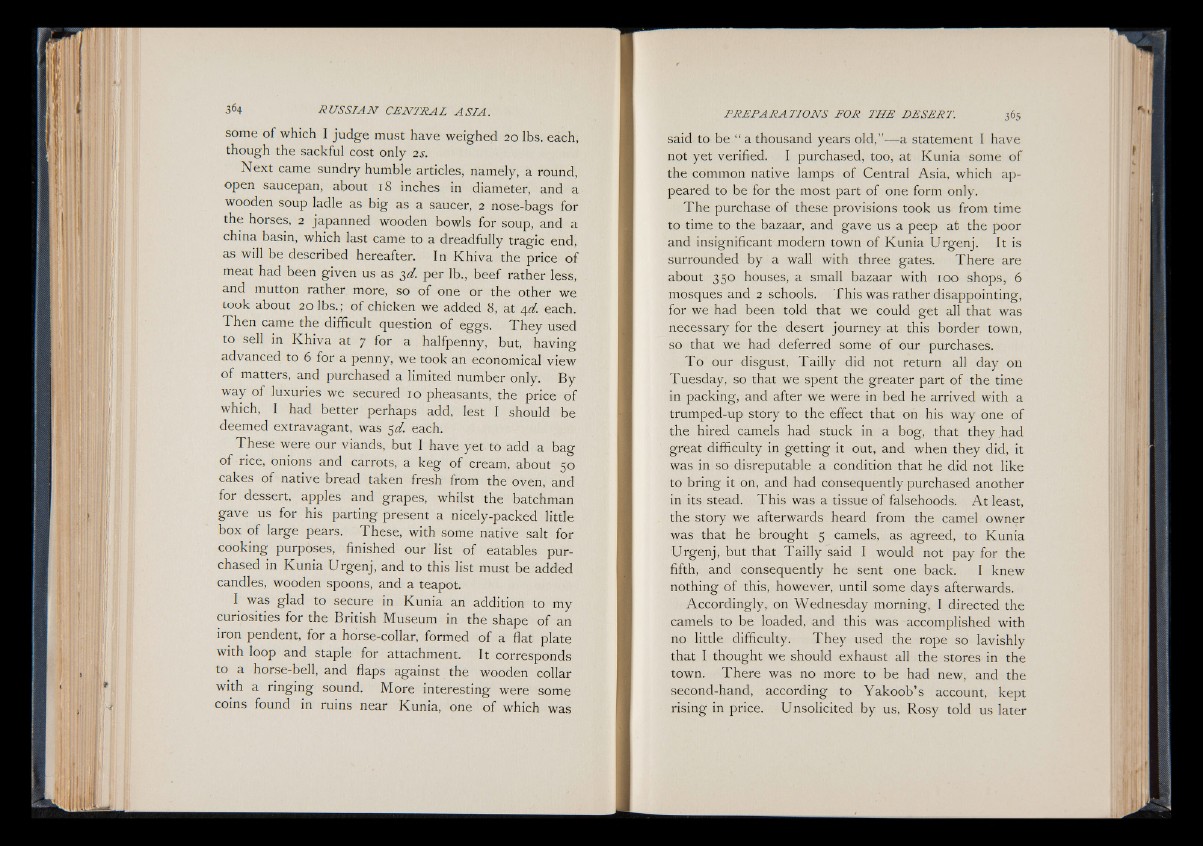
some of which I judge must have weighed 20 lbs. each,
though the sackful cost only 2s.
Next came sundry humble articles, namely, a round,
open saucepan, about 18 inches in diameter, and a
wooden soup ladle as big as a saucer, 2 nose-bags for
the horses, 2 japanned wooden bowls for soup, and a
china basin, which last came to a dreadfully tragic end,
as will be described hereafter. In Khiva the price of
meat had been given us as 3d.. per lb., beef rather less,
and mutton rather more, so o f one or the other we
took about 20 lbs.; o f chicken we added 8, at 4d. each.
Then came the difficult question of eggs. They used
to sell in Khiva at 7 for a halfpenny, but, having
advanced to 6 for a penny, we took an economical view
o f matters, and purchased a limited number only. By
way of luxuries we secured 10 pheasants, the price of
which, I had better perhaps add, lest I should be
deemed extravagant, was 5d. each.
These were our viands, but I have yet to add a bag
of rice, onions and carrots, a keg o f cream, about 50
cakes of native bread taken fresh from the oven, and
for dessert, apples and grapes, whilst the batchman
gave us for his parting present a nicely-packed little
box of large pears. These, with some native salt for
cooking purposes, finished our list of eatables purchased
in Kunia Urgenj, and to this list must be added
candles, wooden spoons, and a teapot.
I was glad to secure in Kunia an addition to my
curiosities for the British Museum in the shape o f an
iron pendent, for a horse-collar, formed o f a flat plate
with loop and staple for attachment. It corresponds
to a horse-bell, and flaps against the wooden collar
with a ringing sound. More interesting were some
coins found in ruins near Kunia, one o f which was
said to be “ a thousand years old,”— a statement I have
not yet verified. I purchased, too, at Kunia some o f
the common native lamps of Central Asia, which appeared
to be for the most part of one form only.
The purchase of these provisions took us from time
to time to the bazaar, and gave us a peep at the poor
and insignificant modern town of Kunia Urgenj. It is
surrounded by a wall with three gates. There are
about 350 houses, a small bazaar with 100 shops, 6
mosques and 2 schools. This was rather disappointing,
for we had been told that we could get all that was
necessary for the desert journey at this border town,
so that we had deferred some of our purchases.
T o our disgust, Tailly did not return all day on
Tuesday, so that we spent the greater part of the time
in packing, and after we were in bed he arrived with a
trumped-up story to the effect that on his way one of
the hired camels had stuck in a bog, that they .had
great difficulty in getting it out, and when they did, it
was in so disreputable a condition that he did not like
to bring it on, and had consequently purchased another
in its stead. This was a tissue of falsehoods. A t least,
the story we afterwards heard from the camel owner
was that he brought 5 camels, as agreed, to Kunia
Urgenj, but that Tailly said I would not pay for the
fifth, and consequently he sent one back. I knew
nothing of this, however, until some days afterwards.
Accordingly, on Wednesday morning, I directed the
camels to be loaded, and this was accomplished with
no little difficulty. T hey used the rope so lavishly
that I thought we should exhaust all the stores in the
town. There was no more to be had new, and the
second-hand, according to Yakoob’ s account, kept
rising in price. Unsolicited by us, Rosy told us later